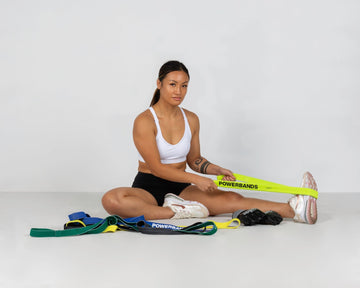Resistance bands are a great way to help you achieve your fitness goals. They can be used to increase strength and muscle size, improve mobility, and act as a warm-up and cool-down before and after workouts. Resistance bands are versatile and offer a variety of benefits.
Using resistance bands may appear to be easy. However, people often make mistakes. In this article, we will discuss the common mistakes and provide advice on how to avoid them so that using the resistance bands will be less confusing.
1) Choosing the Wrong Anchor Points
When using a resistance band, it’s important to anchor the band securely so that it doesn’t move during the exercise. It’s also important to choose an anchor point that is secure and stable, such as a door frame, a wall, or a pole. Make sure the anchor point won’t move during the exercise and that it’s properly secured.
Selecting the appropriate anchor point is vital in order to keep yourself safe. Make sure to choose a reliable and robust object to secure the band and avoid any potential danger.
2) Not Finding the Appropriate Resistance
In order to get the most out of a resistance-band workout, you need to choose the correct band for your fitness level. If the band is too easy, you won’t get a good workout. If it’s too difficult, you risk injury.
Deciding which band to use will depend on the body part being worked on and the exercise you're doing. The more you stretch a band, the greater the resistance will be. Therefore, choosing the right resistance band can help you achieve the desired results for your workout.
3) Using Only One Resistance Band for Your Workout
Using only one resistance band for your entire workout will not be as effective as using multiple bands. Different bands provide different levels of resistance and can target different muscle groups.
For example, a light band can be used for arm exercises, while a heavier band can provide resistance for lower-body exercises. By using multiple bands, you will be able to maximize the benefits of your workout and target different muscle groups.
4) Using Inconsistent Tension on Your Reps
Using inconsistent tension on your reps can lead to ineffective workouts and can even lead to injury. You need to maintain the same amount of tension throughout the exercise.
This will ensure that the muscles are being worked at the same intensity and that you are not risking injury. Additionally, using consistent tension will help to maximize the benefits of the exercise and ensure that you are getting the most out of your workout.
5) Not Checking Your Band for Damages
It is important to check your resistance band for any signs of wear or tear before using it. Damaged bands can break during your workout, which can cause injury. Make sure to inspect the band for any signs of fraying, holes, cuts, or tears before each workout.
If you find any damage, discard the band and purchase a new one. This will ensure that you are using a safe and effective resistance band for your workouts.
Conclusion
Using resistance bands is a great way to add variety and intensity to your workouts. However, it is important to use them correctly to ensure your safety and prevent injury. Following these tips will help you get the most out of your resistance band workouts.
Introduce resistance bands to your workout routine with POWERBANDS®. We have the best exercise bands in the industry that can add a little something to your routine. Visit our page to see our online catalogue.








